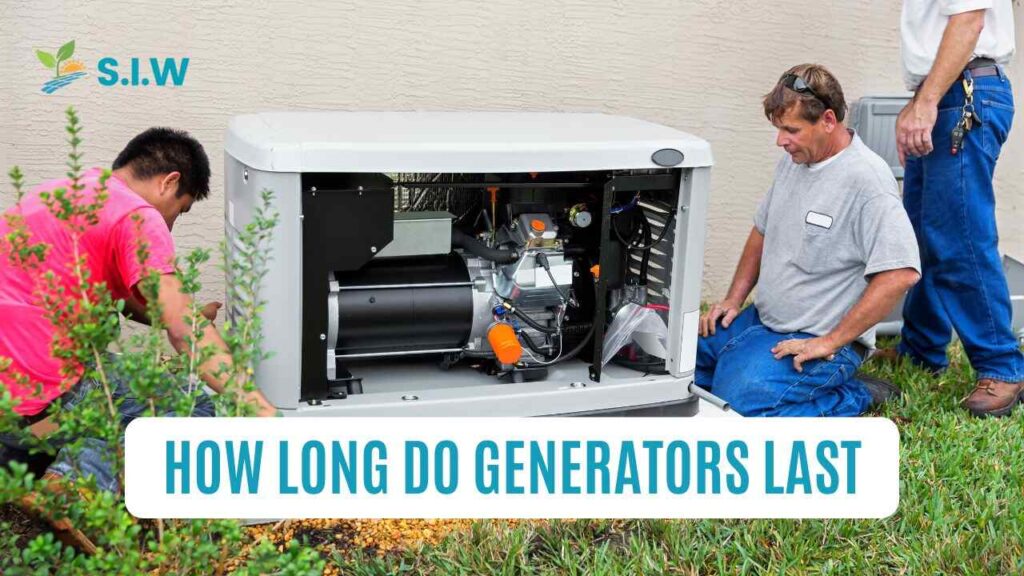Generators are vital for providing backup power during outages and supporting critical operations in various settings, from residential homes to industrial facilities. Given their importance, understanding the lifespan of generators is crucial for maintaining reliability and ensuring that they function efficiently when needed. This article explores the factors that influence generator longevity, the average lifespan of different types of generators, and strategies to extend their operational life.
Factors Influencing Generator Lifespan
Type of Generator
The type of generator significantly impacts its expected lifespan. Generators come in various forms, including portable, standby, and industrial models. Each type is designed for different applications, and their construction, usage patterns, and maintenance requirements vary accordingly.
Portable generators, typically used for temporary or emergency power, often have a shorter lifespan compared to standby generators, which are intended for more permanent and frequent use. Industrial generators, built for heavy-duty applications, generally offer the longest lifespan due to their robust design and higher-quality components.
Usage and Load
The frequency and intensity of generator use play a critical role in determining its lifespan. Generators that are used regularly or for extended periods will experience more wear and tear compared to those that are used sporadically. Additionally, running a generator under a consistently heavy load can accelerate its deterioration.
Proper load management is essential to ensure that the generator operates within its rated capacity. Overloading the generator or running it at minimal loads can both contribute to premature wear and reduced lifespan.
Maintenance Practices
Routine maintenance is perhaps the most significant factor affecting the longevity of a generator. Regular maintenance, including oil changes, filter replacements, and inspections, helps prevent issues that could lead to more significant problems. Adhering to the manufacturer’s maintenance schedule and addressing any issues promptly can greatly extend the lifespan of a generator.
Neglecting maintenance can result in a buildup of wear and tear, reduced efficiency, and eventually, a shortened operational life. It is important to follow recommended maintenance procedures and use high-quality replacement parts. Additionally, integrating solar services can complement your generator system, providing a sustainable energy source that can reduce the overall wear on your generator. By maintaining both your generator and considering solar services, you can achieve a more reliable and efficient energy system.
Operating Conditions
The environment in which a generator operates also influences its lifespan. Generators exposed to harsh weather conditions, such as extreme temperatures, humidity, or dust, may experience accelerated wear.
Ensuring that the generator is housed in a protective enclosure or installing it in a location with controlled environmental conditions can mitigate these effects. Additionally, regular cleaning and inspection to remove debris and prevent corrosion are essential for maintaining optimal performance.
Average Lifespan of Different Types of Generators
Portable Generators
Portable generators are designed for temporary use and typically have a lifespan ranging from 1,000 to 3,000 hours of operation. The variability in lifespan depends on factors such as brand, model, maintenance, and usage conditions.
Regular maintenance and responsible usage can help maximize the operational life of a portable generator. However, due to their design for intermittent use and the demands placed on them, they generally have a shorter lifespan compared to standby or industrial generators.
Standby Generators
Standby generators, often used for residential or small business backup power, generally have a longer lifespan than portable generators. On average, standby generators can last between 2,000 and 5,000 hours of operation.
These generators are designed for more consistent use and are usually installed with automatic transfer switches and other features to enhance reliability. Proper maintenance and timely repairs can further extend their lifespan.
Industrial Generators
Industrial generators, built for heavy-duty applications and continuous operation, typically have the longest lifespan. These generators can last anywhere from 10,000 to 30,000 hours or more, depending on their design, usage, and maintenance.
The robust construction and high-quality components used in industrial generators contribute to their extended operational life. Regular servicing and adherence to maintenance schedules are critical for achieving the upper end of this lifespan range.
Extending the Lifespan of Generators
Regular Maintenance
To ensure that a generator performs reliably and lasts as long as possible, regular maintenance is essential. This includes scheduled oil changes, air and fuel filter replacements, and inspection of critical components such as the battery and cooling system. Following the manufacturer’s maintenance guidelines helps prevent issues that could lead to premature failure.
Load Management
Proper load management is crucial for maintaining generator health. Running a generator within its rated capacity and avoiding frequent overloads can help prevent excessive wear. Additionally, balancing the load across the generator’s phases, if applicable, can contribute to more even wear and longer operational life.
Environmental Protection
Protecting the generator from harsh environmental conditions can significantly impact its lifespan. For portable and standby generators, using a weather-resistant cover or housing can shield them from rain, snow, and dust. For industrial generators, ensuring proper ventilation and controlling temperature extremes can help maintain performance and longevity.
Prompt Repairs
Addressing any signs of malfunction or wear promptly can prevent minor issues from escalating into major problems. Regular inspections and monitoring of the generator’s performance allow for early detection of potential issues. Immediate repairs or replacements of faulty components help avoid prolonged damage and ensure continued reliability.
Conclusion
The lifespan of a generator is influenced by a combination of factors, including the type of generator, usage patterns, maintenance practices, and operating conditions. Portable generators generally have a shorter lifespan compared to standby and industrial models due to their design and usage.
Regular maintenance, proper load management, environmental protection, and timely repairs are key strategies for extending the operational life of a generator. By understanding these factors and implementing best practices, generator owners can ensure reliable performance and maximize the return on their investment. As technology advances and generator designs improve, maintaining these best practices will remain crucial for achieving the longest possible lifespan from these essential power sources.








